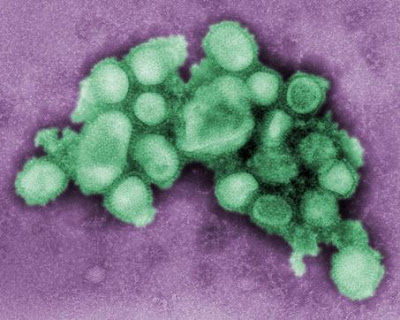 Two more people in Wales with swine flu have died.
Two more people in Wales with swine flu have died.
A 43-year-old woman with underlying health conditions from Carmarthenshire was admitted to Prince Phillip Hospital, Llanelli on 3 October. The patient deteriorated and was transferred to the Intensive Care Unit where she later died on 7 October. Subsequently, routine test results confirmed that the patient had swine flu. However, swine flu was not the primary cause of death.
A 21-year-old pregnant woman from Monmouthshire was admitted to Nevill Hall Hospital, Abergavenny for a planned caesarean section on 25 September. The baby was delivered safely and is well, but the patient was transferred to the hospital’s Intensive Care Unit, after deteriorating. The woman was transferred to the ExtraCorporeal Membrane Oxygenation centre at Glenfield Hospital in Leicester on 30 September. She died on 9 October.
This brings the number of swine flu-related deaths in Wales to three. Wales’ first swine flu-related death was on 15 August – a 55-year-old woman from Caerphilly County Borough.
Another death is currently being investigated.
In future, any swine flu-related deaths in Wales will be confirmed in the Swine Flu Weekly Report that is published every Thursday.
The Chief Medical Officer for Wales, Dr Tony Jewell, said:
“We would like to send our condolences to the family and friends of the women at this difficult time.
“Sadly as the number of swine flu cases rise, the number of people experiencing severe symptoms or complications or even death will inevitably increase. This is the same for seasonal flu in the winter. We should receive the swine flu vaccine in the coming weeks and shortly after GPs will begin administering the vaccines to those most at risk of complications and frontline health and social care workers.
“I must stress that for the vast majority of healthy people, the infection remains mild and they should recover within five to seven days with rest, plenty of fluids and paracetemol.
“People with underlying health conditions, especially heart and lung diseases, are at most risk. Even in the at risk groups – those with chronic conditions, pregnant women and children under 5 and those 65 and over – most people get over the infection with no major concerns.”
If people are concerned, or if they are in these at risk groups, they should contact their GP. Antivirals have the most impact within 48 hours of the onset of flu-like symptoms.
At the families’ request, no further details will be released. The families have requested that their privacy is respected and that the media leave them to grieve in peace.